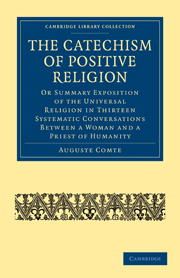 The Catechism of Positive Religion
The Catechism of Positive Religion Book contents
- Frontmatter
- PREFATORY NOTE TO THIRD EDITTON
- Contents
- PREFACE
- POSITIVIST LIBRARY
- HINT TO THE READER
- INTRODUCTION
- First Part EXPLANATION OF THE WORSHIP
- CONVERSATION III The Worship as a Whole
- CONVERSATION IV Private Worship
- CONVERSATION V Public Worship
- Second Part EXPLANATION OF THE DOCTRINE
- Third Part EXPLANATION OF THE REGIME, OR SYSTEM OF LIFE
- CONCLUSION: GENERAL HISTORY OF RELIGION
- TABLES
CONVERSATION V - Public Worship
Published online by Cambridge University Press: 05 October 2010
- Frontmatter
- PREFATORY NOTE TO THIRD EDITTON
- Contents
- PREFACE
- POSITIVIST LIBRARY
- HINT TO THE READER
- INTRODUCTION
- First Part EXPLANATION OF THE WORSHIP
- CONVERSATION III The Worship as a Whole
- CONVERSATION IV Private Worship
- CONVERSATION V Public Worship
- Second Part EXPLANATION OF THE DOCTRINE
- Third Part EXPLANATION OF THE REGIME, OR SYSTEM OF LIFE
- CONCLUSION: GENERAL HISTORY OF RELIGION
- TABLES
Summary
The Woman.—When entering on the direct study of our public worship, I should submit to you, my father, the answer which I have already given of myself to superficial but honest criticisms, directed against this solemn adoration as a whole. It is urged that each Positivist is glorifying himself when paying honour to a being which is of necessity composed of its own worshippers. Our private worship is in no way open to this reproach: it applies solely to the direct worship of Humanity, especially where the homage is collective. But we can easily repel it by the true idea of the Great Being which is predominantly subjective in its composition. They who testify their gratitude to her are in no way assured, in general, of their final incorporation. They have only the hope of this reward, because they count on deserving it by a worthy life, the judgment on which always rests with their successors.
The Priest.—Your correction is fully in agreement, my daughter, with the true spirit of our public worship, in which the present glorifies the past the better to prepare the future, naturally putting itself out of sight before these two immensities. Far from stimulating our pride, these solemn prayers tend unceasingly to inspire us with a sincere humility. For they make us profoundly conscious to what a degree, despite our best collective efforts, we are incapable of ever rendering to Humanity more than a very small part of what we have received from her.
- Type
- Chapter
- Information
- The Catechism of Positive ReligionOr Summary Exposition of the Universal Religion in Thirteen Systematic Conversations between a Woman and a Priest of Humanity, pp. 97 - 112Publisher: Cambridge University PressPrint publication year: 2009First published in: 1891


